Apple's Mac mini - Tempting PC Users Everywhere
by Anand Lal Shimpi on January 25, 2005 7:39 AM EST- Posted in
- Mac
A First Look at Pages
The idea behind Pages is to make document creation, layout and publishing easier than ever before. If you've ever used Word for anything above and beyond just a text editor, it often times have little quirks that can frustrate you after dealing with them for a while - such as footnotes that don't always work properly, an ornery table of contents or especially dealing with graphics and text boxes and getting them to not screw up the pagination of your document. Word is a very powerful word processor, but in all of its might, it has lost a considerable amount of simplicity. Then there are page layout and publishing applications that generally require a higher level of expertise than what the beginner user is going to have, and they are generally much more expensive than $79. So there is a need for something else. The question is whether or not Pages happens to be it.

Before I get to the built-in templates within Pages, let me talk a bit about the interface. When you're first dropped into Pages, you immediately notice that the interface is extremely bare, almost to the point where it is bland. There is no font drop-down - all of the buttons you're used to seeing in a word processor or any application for that matter are all gone. There's a row of 10 oversized buttons at the top of the page and that's it.
![]()
The default view in Pages has no rules, no layout markers, nothing. You can turn all of those on, but for me, they unnecessarily clutter the interface to be on all the time.
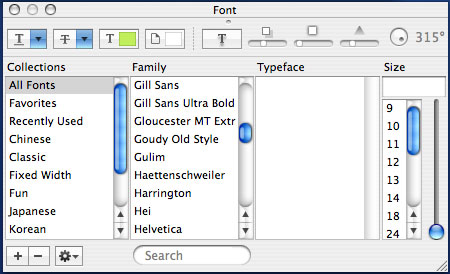
I mentioned that there is no font drop-down in Pages. Instead, in order to change the fonts and settings, you have to use the font panel, which you bring up by either hitting the button on the tool bar or hitting Command + T. Despite my initial reactions to it, I actually preferred Apple's decision here simply because I rarely adjusted my fonts when typing in Word; it was just something that I had expected to be in the toolbar and unnecessarily so. Font sizes are another thing, and this is one area where Pages encourages you to go in a much different route from what you may be used to. Normally, you create page or paragraph headers by either making the header bold or increasing the font size. You can obviously do the same using the font panel in Pages, but there is an alternative. Pages heavily encourages the use of styles for text, which are both pre-defined and user-definable.
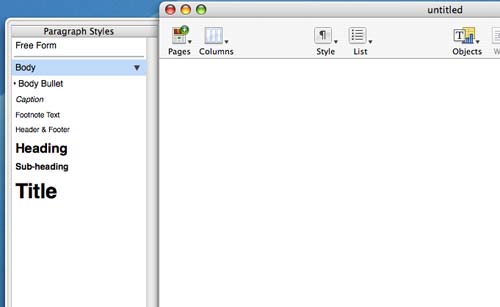
The other thing that Pages does extremely well is its handling of columns - there's a columns drop-down at the top of the page that will let you select from 1 - 4 columns. You can adjust the number of columns within any shape object or apply it to the document as a whole, quite easily.
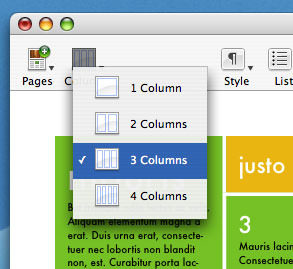
Despite the relatively simple interface, there are quite a few controls offered within Pages, they just remain hidden until you bring up the Pages Inspector. The Inspector window is a small window that lets you adjust options for everything in Pages, as well as features things like document information. If there's anything that you need to do or find in Pages, it's in the Inspector.
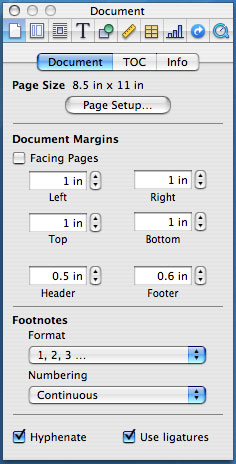
For example, if you want to define more than 4 columns, click on the column button in the Inspector. If you want to change how text wraps around objects, click on the appropriate button in the Inspector. Colors, tables, charts, everything is customizable from the Inspector - and when you're done, you can leave it on the desktop or hide it. You can also open up multiple Inspectors, each at a different settings page if you like having access to everything without bringing up more windows.
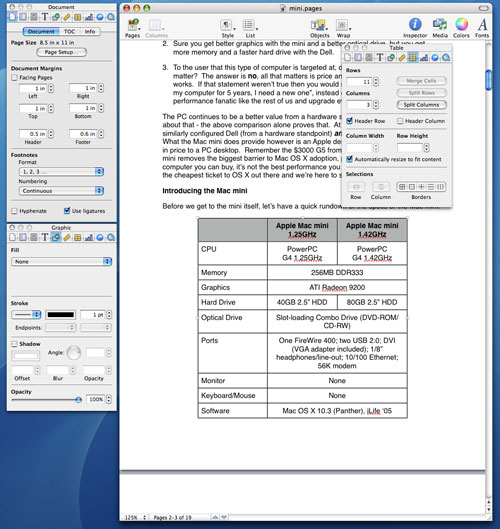
Multiple Inspectors










198 Comments
View All Comments
karlreading - Tuesday, January 25, 2005 - link
#23:You kick up against mac bashers and then u have a pop at AMD fans. HOW RUDE. It's quiet obvisouse your a intel fan. your no better than the people you try to show up, claiming they do things whilst you do exactly the same things yourself.
Im a AMD fan, but i dont find that i have to have a pop at intel, mac, or anyone else. AMD make fine products. Intel make fines products. Apple make fine products. just each ones products match diffrent peoples expectations and needs.
as for the mac mini, i think its a excellent little machine. As Anand says, more appliance than computer. i think they will do well.
karlos
Dranzerk - Tuesday, January 25, 2005 - link
#2 in response to #1 Im talking about how lots of people will buy these because it's the "it" thing to do, and I will be looking on Ebay for when they are sold cheaper.How was that hard to understand?
michael2k - Tuesday, January 25, 2005 - link
Well, if it's within the return period, you can technically 'return it' and get another, with the Tiger CDs/DVDs, or just tell the Apple person, "It would be better for you to send me the Tiger CDs, wouldn't it, than to return this one to CompUSA and get a new one with the new OS right?"So within two weeks I would expect it free, basically (though it takes some social engineering). I don't know about the 'heavy discount' however.
bupkus - Tuesday, January 25, 2005 - link
Perhaps Apple should have offered the mini with 512MB as standard and then offered a downgrade option rather than their upgrade option.bob661 - Tuesday, January 25, 2005 - link
If you want Tiger, just wait till it's released then by the Mac.msva124 - Tuesday, January 25, 2005 - link
You say if tiger comes out right after you buy your machine, it is heavily discounted. Define "right after".Draco - Tuesday, January 25, 2005 - link
Great article. Very refreshing to see so much Mac coverage. Look forward to more.Ecgtheow - Tuesday, January 25, 2005 - link
#59: If Tiger comes out right after you get your machine, you can get it for $30 through the "Up-to-date" program.sluramod - Tuesday, January 25, 2005 - link
#57: good news for apple then ... $499 now + $100 or so laterBurbot - Tuesday, January 25, 2005 - link
#40: Thanks for correction.#53: Very true. A lot of people do not understand the connection between memory amount and performance. I've seen that more then once - folks have a machine with 128 megs of RAM that is just dying under load, and when I suggest them a memory upgrade they say "But isn't Ghz the thing that makes it go faster?".